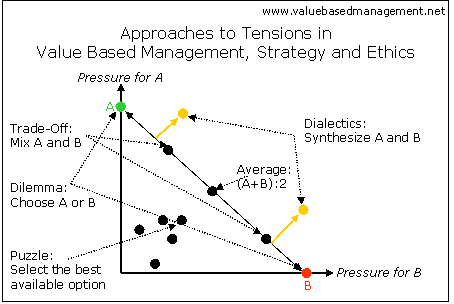
Dialectics

 |
Dialectics |
 |
|
Articles | Books | Dictionary | Faq | Home | Leaders | Organizations | Search
|
Dialectical Inquiry |
Summary of Dialectics. Abstract |
History of Dialectical Inquiry (DI)
From I Ching, Lao Tzu, Heraclites, Plato, Socrates, Aristoteles, to Kant, Hegel, Fichte, Marx, and Engels.
Dialectics (D) has a long history during which the meaning and understanding of it changed. In Asia, the idea that everything is made of opposites--yin and yang--dates back to the I Ching around 3,000 years ago and the Taoist master Lao Tzu around 2,500 years ago. Taoism holds that change is the only constant. Taoist philosophy also understood that "gradual change leads to a sudden change of form (hua)."
Also around 2,500 years ago in ancient Greece, Heraclites advanced the idea that all change comes through the struggle of opposites. The Aztecs also held the idea of nature being made of opposites, as did the Lakotas in North America. In Plato's dialogues, Socrates typically "argues" by means of cross-examining someone else's assertions in order to draw out the inherent contradictions within the other's position. Aristoteles compared Dialectics with Rhetoric (the art of convincing others) stating that dialectics are dealing with an upright looking for the truth.
For some reason the idea of everything being made of opposites died out in Western thought until Kant and Hegel revitalized the idea of dialectics just as the industrial revolution was beginning.
Finally Fichte made the
implicit triad existing in Hegel's work explicit by clearly
distinguishing between Thesis, Antithesis and Synthesis,
and this idea was subsequently extended by Marx and Engels.
Use of the DI Method in VBM, Strategy and Ethics
Strategy, Value Based Management and Business Ethics (Values) are all complex by nature (Compare: History of Value Based Management). D offer a number of advantages to those that must deal with this inherent complexity and with these seemingly contradicting forces (tensions).
 De Wit and Meyer (Strategy: Process, Content, Context) mention the
following advantages of taking a dialectical approach to strategic
paradoxes and complexity (instead of treating the tensions as
puzzles, dilemma's or trade-offs or taking the
average):
De Wit and Meyer (Strategy: Process, Content, Context) mention the
following advantages of taking a dialectical approach to strategic
paradoxes and complexity (instead of treating the tensions as
puzzles, dilemma's or trade-offs or taking the
average):
A method resembling D is the Devilís Advocate Approach. This method is also useful in exposing underlying assumptions, but has a tendency to emphasize the negative, whereas DI is a more balanced and harmonious approach.
Book: Bob de With and Ron Meyer - Strategy: Process, Content, Context
Book: Alex Lowy and Phil Hood - The Power of the 2x2 Matrix - Using 2x2 Thinking to Solve Business Problems and Make Better Decisions
Book: Barry Johnson - Polarity Management: Identifying and Managing Unsolvable Problems
Book: Charles M. Hampden-Turner, Fons Trompenaars - Building Cross-Cultural Competence: How to Create Wealth from Conflicting Values
| 👀 | TIP: To learn more, have a look at the Dialectics center: Summary, forum, tips and tools. |
Compare with Dialectical Inquiry: Root Cause Analysis | Theory of Constraints | Brainstorming | Six Thinking Hats | System Dynamics | Scenario Planning | Game Theory | Spiral Dynamics | Real Options | Kepner-Tregoe Matrix | Plausibility Theory
About us | Advertise | Privacy | Support us | Terms of Service
©2025 Value Based Management.net - All names tm by their owners